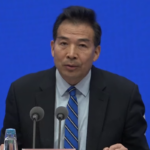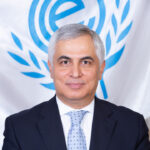UNITED NATIONS, Sep 16 (APP): The new UN General Assembly President, Volkan Bozkir, says he hopes to make “meaningful progress” in the long-running Intergovernmental Negotiations (IGN) aimed at restructuring the Security Council to make it more representative, transparent, effective and accountable.
“I hope that through active engagement of members states and pragmatic approaches we will be able to make meaningful progress on this difficult issue,” he said at a news conference after the 75th session of the Assembly that he presides over, opened on Tuesday.
Full-scale negotiations to reform the Security Council began in the General Assembly in February 2009 on five key areas — the categories of membership, the question of veto, regional representation, size of an enlarged Security Council, and working methods of the council and its relationship with the General Assembly.
Despite a general agreement on enlarging the Council, as part of the UN reform process, member states remain sharply divided over the details.
Known as the “Group of Four” — India, Brazil, Germany and Japan — has shown no flexibility in their campaign for expanding the Security Council by 10 seats, with six additional permanent and four non-permanent members.
On the other hand, the Italy/Pakistan-led Uniting for Consensus (UfC) group strongly opposes any additional permanent members, saying such a move would not make the Security Council more effective and also undermine the fundamental principle of democracy that was based on periodic elections. The group advocates more non-permanent members on the Council.
The Security Council is currently composed of five permanent members — Britain, China, France, Russia and the United States — and 10 non-permanent members
Responding to a question about how he would try to break the deadlock in the reform process, Bozkir, a veteran Turkish diplomat, said, “Security Council reform is very important, not only for the member states but also to the United Nations as a whole. Of course, it is a complex challenge that is closely linked to one of the main aims of the organization, that is peace and security.”
He said during the current session, the IGN would build on the meetings held in the previous sessions.
“There is no doubt that the membership of the Security Council as well as its working methods must reflect the realities of the 21st century,” the president added.
At the same time, he said he was committed to “support this process in an impartial, objective and open-minded manner.”
He said an “urgent issue” was the appointment of the facilitators for the IGN and he would do it after “consulting with countries so that the decision of mine will be acceptable and will allow the process to go further”.
At a recent session of IGN, Pakistan’s UN Ambassador Munir Akram said the Council’s membership/size must be expanded to embrace the possibility of every UN member state being elected to the Council.
“Equitable representation has been the primary impulse behind all Security Council reform efforts,” he said.
Noting dissatisfaction with the Council stemming from the role of permanent members, Ambassador Akram said, “Only an acceptable formula with an increase in the non-permanent members, and rotation through democratic elections, can provide more equitable representation for all states on the Council.
“Such rotation, combined with regional representation, offers possibilities for a fuller representation of members of various groups of states.”







